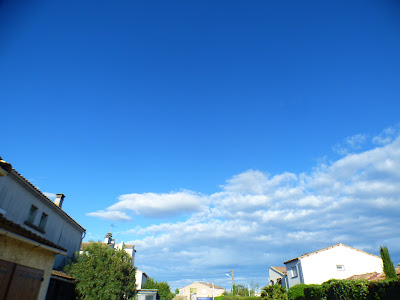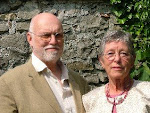Judas tree in full flower at our Aquitaine hotel
 I am writing this over the Easter weekend and our first afternoon watching cycling. A thrilling circuit race in Holland saw the Dane Skjelmose beat Pogacar in a photo finish. We look forward to more in the build-up to the Tour - French tv does these events proud.
I am writing this over the Easter weekend and our first afternoon watching cycling. A thrilling circuit race in Holland saw the Dane Skjelmose beat Pogacar in a photo finish. We look forward to more in the build-up to the Tour - French tv does these events proud.For many years I have kept lines of communication open through various email links and this blog as well as on Facebook. I think every one of my contacts is someone I know - if not a close friend, someone I have good reason to be in touch with, and almost never respond to 'friend requests' out of the bllue. I have a couple of 'not Facebook' lists and some individual correspondents I write to separately. I think it is important to match people's wishes however varied. But every now and again a new link to an old friend on Facebook pops up. It is the easiest latform to combine pictures with text, and as an avid photographer I am always glad to chat in pictures as well as in words. The one thing I find difficult is the intrusion of unexpected sounds, usually when a video or someone's slide show blares out music. We listed to a lot of music on the radio, but I do think people should be able to choose when and if there is sound. Mini-rant over.
Despite our efforts to improve our French and become more integrated here, there are some things British we value, especially listening to BBC Radio 3. So we have been disturbed, angry even, about plans to restrict overseas access to Radio 3 which are postponed but not abandoned (tv has long been difficult but we are adapting to the things we enjoy on French tv and don't miss much of the UK output - maybe cricket!). Re Radio 3, he stupid phrase 'rights issues' and the claim that it is to 'improve the service for listeners' are incomprehensible. We have always paid, and as it happens still pay, all our taxes in the UK even though we are registerd to pay taxes in France; and if necessary I would pay a charge to access BBC, but no such offer has been mentioned. We are of course not the only people affected and there have been similiar comments from others in the expat press. Heaven knows whose rights are involved - certainly not ours. I would use the phrase 'mean-minded' if I thought there was any actual mind involved, not just faceless bureaucrats saying 'nothing we can do guv'. Rant over - we are of course investigating ways round (VPN etc. etc..) , and I supppose it is at least a way of keeping the brain active.
In the last blog I mentioned Eleanor of Aquitaine whose biography Mary is now well into. A lot of her historical presence is due to her amazing longevity for the period, since the first part of her life was mainly child, wife and prisoner. Alison Weir, the author of the biography, says "She was christened Aliénore, a pun on the Latin alia-Aénor, ‘the other Eleanor’, to differentiate her from her mother" - said mother being Aénor of Aquitaine. The biography is well-written and although the first half is largely about the blokes Eleanor was married to - the king of France, then Henry II of England, whose kingdom started out including Aquitaine, so the wester part of current France, the biography becomes more and more about her as her husbands and sons fell by the wayside. The sons including another Henry (crowned by his father as ' the Young King'), who died before his dad, then Richard who was not quite as rosy a personality as the myths and films suggest, and then John who seems to have been not quite so bad as his reputation suggests. But they were all medieval monarchs, and as we are reminded daily even being elected (let alone real demagogues) does not prevent brutal behaviour.
While imprisoned in France, waiting for an extortionate ransom, Richard "had taken to composing poems and songs to express his feelings, the most famous of which is ‘J’a nuns hons pris’ – ‘I have many friends but their gifts are few . . .’ In it, he refers bitterly to Philip, ‘my overlord, who keeps my land in torment’ in contravention of his feudal oath. He also complains that everyone has forsaken him. This song, one of only two of Richard’s compositions to survive, was written in Provençal with a musical score, and was dedicated to his half-sister, Marie, Countess of Champagne." There is also a Nottinghamshire connection - Alsion Weir continues "On 2 April, Richard and Eleanor rode to the royal hunting lodge at Clipstone (now a ruin known as King John’s Palace) in Sherwood Forest. The King had never visited Sherwood before, and it ‘pleased him greatly’. This is the context in which many later legends of Robin Hood were set, but the evidence for Robin Hood’s identity is sparse and confusing: if he existed, he probably lived in the thirteenth or early fourteenth century. It was not until 1521, in the Scottish writer John Major’s book, The History of Greater Britain, that the Robin Hood legends were set in the reign of Richard I". I will always remember Kevin Costner's Robin leaping from his boat by the White cliffs straight into Sherwood Forest - time travel indeed in an age when journeys took ages.
But my reading is eclectic - one book I have since read is Sophy Roberts' The lost pianos of Siberia. Apart from making you feel very cold just imagining the setting and the lives of many of those she travelled to meet in trying to track down the instruments, the subject is not only explored for its own sake but to illuminate the old and more recent history of the area, the USSR and the Soviet era. Some of the brutal hardship and rank cruelty she describes is difficult to take in, the harshness of the Tsars mimicked later by the Stalinist and Soviet versions of repression. The book nevertheless expresses the love and passion of the author for pianos and their music.
Siberia of course borders China, and we get glimpses of the forces ranged against the instrument and its music: "Mao Zedong’s widow, who was fond of piano music, didn’t quite manage to save the instrument from its unpalatable Western reputation. ‘During China’s Cultural Revolution,’ writes one leading historian, ‘the piano was likened to a coffin, in which notes rattled about like the bones of the bourgeoisie". But in among the incredulity of many people she met that she should go all that way in the cold looking for pianos which had long since been neglected and forgotten, there were touching encounters with both instruments and the human beings that owned and played them. An unexpected pleasure to read.
One other thing about reading. In our French conversation groups we read aloud a French text and translate bit by bit into English (our French helpers have an easier time reading and a harder one translating). Our current Tuesday text is Alan Bennett's La dame à la camionnette (The lady in the van) which we Brits know quite well from, among other things, the tv film with Maggie Smith. The French trtnaslation is very good, and everyone is amused and entertained by its wry humour. It's quite a short text, so we shall have to start searching for a new book soon.
 |
| A separate group on Tuesdays also works in French and English |
I can't finish without a brief reference to the world around us, a different kind of careless brutality which is on all our minds. Another kind of listening we often turn to is podcasts, and the clearest views we have heard recently of the situation in the US has come from Timothy Snyder whose books and podcasts I've mentioned before. The Colin McEnroe show has an hour-long interview with Snyder, one of the frew people I've heard to refer to comparisons between the Nazis and the current era with authority and balance.











No comments:
Post a Comment